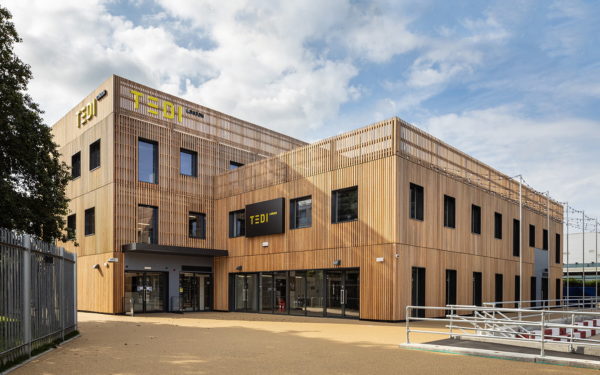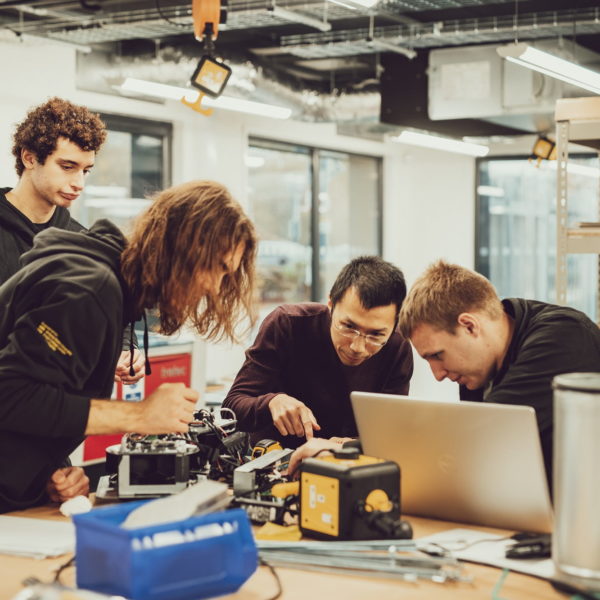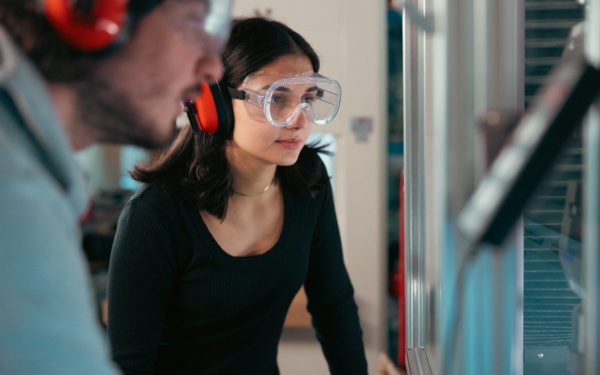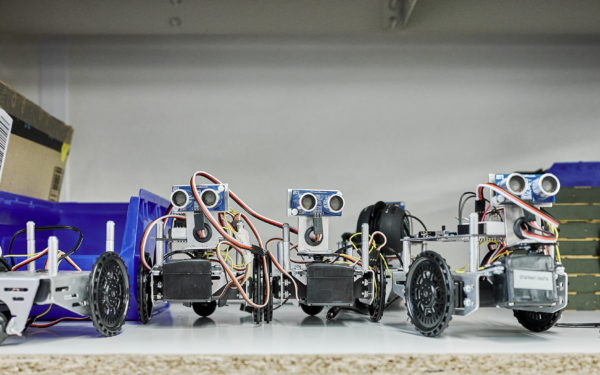
Cert HE
Certificate of Higher Education in Global Design Engineering

Course highlights
- Get a taste of Global Design Engineering
- Understand if degree study is for you
- Gain a Level 4 qualification
- Establish connections with industry
- Gain practical, hands-on engineering experience through projects
- Develop a broad range of skills that you will be able to take into the workplace
Overview

The Certificate of Higher Education in Global Design Engineering (Cert HE) enables you to explore the content and learning outcomes of the first year of the Global Design Engineering BEng.
This programme bridges the many disciplines of engineering, including mechanical, computer, civil, environmental and product design. Projects will be developed around key themes such as smart cities, sustainability, user-centred design and manufacturing. These projects will be real-life industry challenges and will involve collaboration with industry.
This interdisciplinary programme is ideal if you’re interested in all aspects of engineering and don’t want to decide on a specific discipline. The skills and knowledge you will gain are equally applicable to systems, products and processes across engineering.
The course is well-suited for anyone considering higher education but unsure about, or unable to, commit to the full 3 year degree. On completion of the certificate, there is the opportunity to progress to a diploma or the degree.
Course content
The TEDI-London programme will comprise the following compulsory (core) modules. There are no optional modules.
-
Here, we’ll introduce you to the fundamental engineering and design principles. Developing your knowledge and understanding of modern design and development.
You’ll undertake a real-world design challenge in a team, considering the practical, ethical, environmental, social and cultural impacts of engineering design.
You’ll hone your team working, research, critical thinking, problem-solving and communication skills.
-
Develop your knowledge of the fundamentals of the engineering sciences by ‘reverse engineering’ a product (taking it apart). You’ll advance your analytical, measurement and experimental investigation techniques. Gain an understanding of how the fundamentals of the engineering sciences govern the design and performance of systems and components.
Through case studies, and working a design in the reverse direction, you’ll gather data on the engineering principles, manufacturing processes, materials and the assembly. You’ll review competitors and investigate improvements to the design, considering costs, maintenance and the product lifecycle.
-
You’ll start to look at engineering as a professional multi-disciplinary activity. Designing a prototype for a product, you’ll integrate different aspects of engineering and apply the knowledge and skills you have learnt so far to create a solution to a brief.
Through masterclasses and workshops, you’ll work in a team to research, design, manufacture and prototype a product to meet a given specification. You’ll test your prototype and get user and functional feedback to develop your design by implementing the feedback.
Depending on your project, which is usually related to ‘right to repair’, you’ll gain practical skills in prototyping and manufacturing such as 3D modelling, laser cutting and 3D printing.
-
Introducing you to industry-standard modelling and numerical analysis, as well as specialised engineering software packages which are appropriate for a design engineer. Together, we’ll explore and appreciate their potential for solving mathematical and engineering problems.
You’ll cover aspects of mathematical modelling, spreadsheets, principles of computer programming, numerical analysis packages, information modelling, sensors and control as well as cybersecurity. Using these skills, you’ll conduct experiments using sensors, instrumentation, and measurement.
-
Smart cities use data and digital solutions to improve networks, services and infrastructure for the people who live and work there. Learn about designing for smart cities, considering energy and the environment and using material sustainably for a healthy living space.
Develop and apply your understanding of data collection, the Internet of Things, energy and environmental issues, power systems and computing technologies with respect to a global design environment.
Again, working in a team, you’ll consider various engineering technologies to design a safe and clean environment, for your first project on smart cities.
-
We’ll prepare you to start your personal and professional portfolio using the Engineering Council’s academic framework to start your journey to becoming a professional engineer. You’ll begin to become aware of, and reflect on, the development of your academic, professional and personal skills.
In your professional engineering practice, you’ll cover aspects of ethics, codes of practice, time management, problem solving, project management, critical thinking and your professional registration. Alongside, core skills in mathematics, natural sciences and engineering principles.
What you’ll learn

You will acquire knowledge and understanding of:
- The importance of context and understanding of user needs in real-world global problems and the relevance of ethical, environmental, social and cultural aspects of engineering design
- The underpinning scientific, mathematical and engineering principles and methodologies relevant to engineering and design
- The characteristics of materials, equipment, processes, or products
- The design process and design methodologies
- How to apply the principles of engineering design and manufacturing design and development to provide solutions
As part of this certificate, you will develop a professional portfolio reflecting upon what you learn throughout the year.
Project work

You’ll work hands-on in our ‘makerspaces’, both individually and in groups, to research, design and create conceptual designs, or artefacts and prototypes. You’ll be guided through the project and problem-based learning approach through tutorials that provide the opportunity to discuss challenges associated with the projects and share your ideas and learn from each other.
Teaching comprises workshops, masterclasses, group discussions and practical sessions in the makerspaces. This is supported by individual theoretical study through our online learning environment.
Assessment is a mixture of group project reports, individual reports, pitches, presentations, demonstrations, short videos and posters. There will also be two open book examinations at the end of the year.
Entry requirements
The following criteria is intended as a guide to help you gauge if TEDI-London is for you:
- If studying A Levels, IB, BTEC (or any post 16 education) you’ll be on track for approximately 112-120 UCAS points or equivalent
- GCSE Maths grade C/4 (or equivalent Level 2 qualification)
- You may be invited to an online interview
No Maths A-Level? No problem
We are not saying maths isn’t important to study engineering – it is! However, we don’t see a Maths Level 3 qualification as essential to studying with us and becoming an incredible future engineer. Alongside all the other engineering skills that you’ll develop, we’ll support you throughout your maths journey with us, and it’ll become yet another tool to help you change the world for the better.

